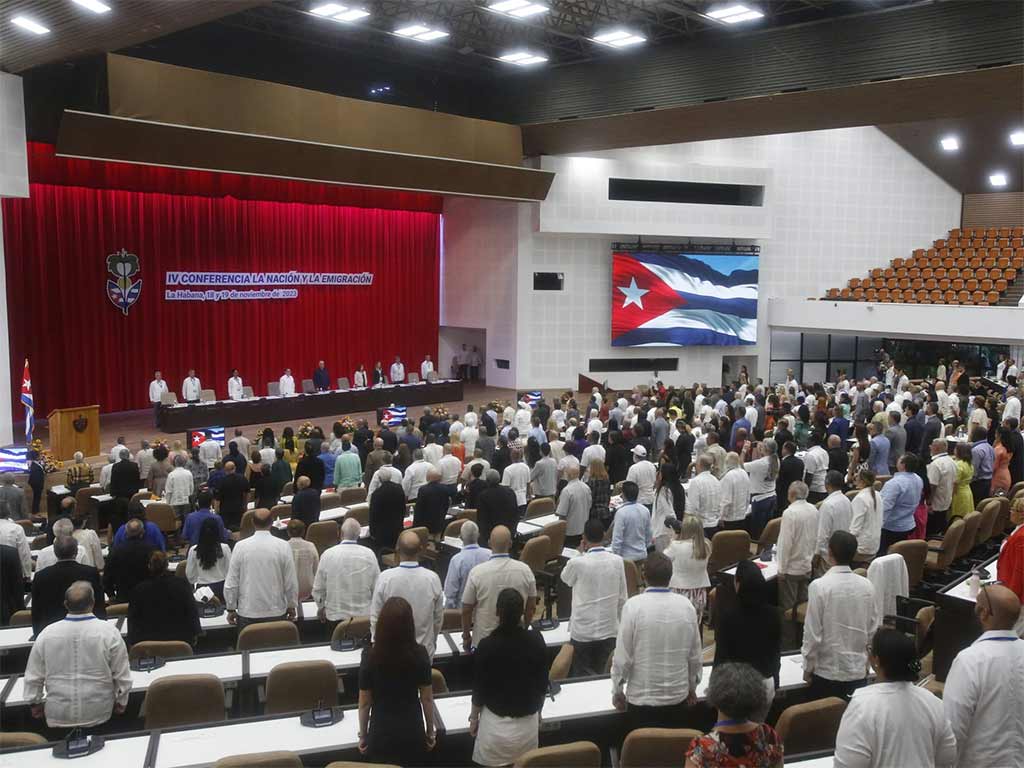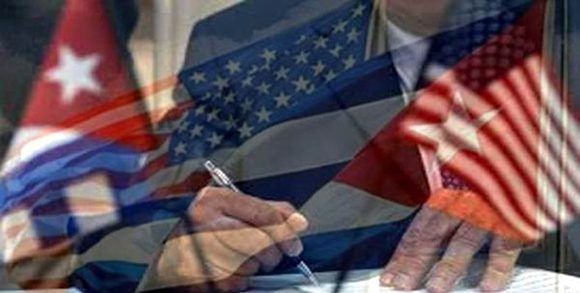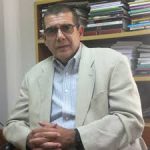Echoes of the IV Nation and Emigration Conference

Crédito: Cubaminrex
During November 18 and 19, 371 Cubans residing in 56 countries attended the sessions of the IV Nation and Emigration Conference in Havana. Hundreds of relatives, officials, friends and acquaintances welcomed them and shared time with them, as many arrived several days before the formal schedules of the event, and even several days later many of them will walk around the Cuban geography in a thousand purposes.
It is difficult to set a precise date for the beginning of the conference and perhaps it will be impossible to fix its end date. There are several reasons for this. It is true that the third conference took place 19 years ago, and it is also true that there is no commitment on the regularity of the same in the future. But it is undeniable that hundreds, thousands of Cubans have been in permanent contact with their country of origin in recent years and will continue to do so in the time to come, with or without events in between. For them, connecting with Cuba is not something exceptional.
Of the series of conferences initiated in 1994, this last one is perhaps the one that has benefited the most from the steps, measures and changes that have been implemented before the event and not during it. In fact, this time the main initiatives did not revolve around “new measures”, as quite a bit of time had to be spent explaining and sharing what was ALREADY DONE, particularly since the adoption of the new Constitution in 2019.
It is inevitable that both those who support the organization of these meetings, as well as those who question them, have counted the time elapsed between them: the first in 1994, the second in 1995, the third in 2004 and the fourth in 2023. And it is true that they are chronologically distant from each other, but that is not the main reading.
It is easier to understand why they have happened in each of those moments if we remember that they have been organized in foundational junctures for the country. In 1994 and 1995 we were just beginning to take off in the years of the so-called Special Period, in 2004 we were beginning to face George Bush’s so-called Plan for a Free Cuba and now we have survived the impact of COVID19 and Bidentrumpism. All of them are junctures in which we understood that our strength multiplies if we act as a whole.
We have once again paid tribute, and there is no other word, to those young people who before, during and after the so-called dialogue of ’78, overcame the fears of their parents and their environment to reach that Island that was in their blood and made them different. Respect also for the Cubans on this side of the seawall who understood then that it was necessary and vital to begin that re-union. But years went by before we managed to disconnect the possibility of celebrating these events, in the required magnitude, from the ups and downs of the U.S. policy against Cuba. Today the reality is different.
In the early 1990s, an accelerated process of growth and expansion of the Cuban consular service began. The geopolitics of the world had changed dramatically. Hundreds of Cubans who used to travel on exchange lists with friendly countries now needed a passport to document their identity in a different universe. Thousands of others, who were studying or working in destinations where they had also raised families, saw new frontiers emerge around them, distancing them from their country of origin. Something similar happened with the resumption of family charter flights from the United States.
In other words, since the early 1990s, a very different number of Cubans began to visit Cuban territory without traveling. They went in and out of Cuban consulates abroad to receive services, express complaints, claim support, or simply to communicate in a new cultural environment “with someone who could really understand them”.
This last conference tried to summarize the antecedents of those years, some were missing and others were overemphasized, but the whole logic of that time was about how to reconnect and make that link sustainable. Migratory-consular measures were put into effect, others for possible studies in Cuba for citizens and descendants, small cultural projects began. And then came the eight years of a pre-Trumpist essay in the figure of George W Bush.
The times are not comparable, nor are the intensity of the plans against Cuba, but it is worth remembering and explaining to the younger ones that the fixation of that government with the Cuban Revolution not only led to the definition of a detailed plan to crush it, but even to the appointment of the person who would exercise the functions of governor of the Island, once the government was overthrown. A kind of early Guaidó.
It should also be noted that in those years practically all the emphasis of the process was placed on the emigrant’s link with the country of origin and the inverse process, that is, the one who is on the island and goes abroad on a temporary or permanent basis, was not a fundamental part of the equation. In other words, we were talking about how the restrictions to immigrate were reduced, while the existing restrictions to emigrate remained in force.
All of this took a radical turn with the immigration reform of 2013. And this is one of the reasons why it can be said that this last conference did not require new actions during its celebration, because there were many of a transcendental nature that had happened before and that by themselves created a new context.
This conference follows and does not precede the hundreds of actions and contacts of the associations of Cubans living in dozens of countries, collective actions before parliaments in different capitals, huge or punctual cultural festivals, but which made the majority dance to the same music.
The list of what can be considered new at the 2023 conference is long and it may be weeks before it can be completed, or never happen at all. Without expressing them in order of importance, a few can be proposed:
– None of the participants who came from abroad were “reconnecting with their country”. They had already done so long before and some did not even go through the “disconnection” period. Moreover, it could be argued that almost all the attendees, including the youngest, only 14 years old, brought their “own briefcase” in terms of projects already developed or to be developed, from culture to MSMEs, from a classroom to a church.
– Never before had such a variety of Cuban officials been present at the panels and side events, from the highest level (i.e. President, Prime Minister and Ministers) to those who specialize in specific topics. And let us clarify that this did not happen before for lack of interest or commitment, but because the diversity of the dialogue is now much more comprehensive and reaches almost all sectors of the country’s life.
– Formal and informal thanks were reiterated for the immense work of the emigrants, particularly in view of the impact of COVID19 in Cuba. The Cuban experts who created the vaccines were embraced several times by those leaders of the guilds abroad who provided the disposable syringes and other supplies that made it possible to immunize our population. It should also be noted that several hundred emigrants sought refuge from the pandemic in Cuba.
– All those who came from abroad to the event did so with their valid passport, without the need to use complementary documents, with no limits to their stay. Moreover, for the first time, many of those present there coexist in their vision with what is there and what is here, because they live both experiences at the same time, they are repatriated. The route now was not airport-conference-airport, but home-conference-home.
– A good part of the interventions were not in the sense of what needs to be changed for “me to be able to do”, but directed to what “I can do” in terms of what has already changed, what is my space and to what extent it grows. There were several references to frequent dialogues, group or personal, with the Chamber of Commerce, Ministry of Education, religious congregations, sports associations and others.
– Needless to say that Fidel Castro’s work, thinking and how to do was present throughout the preparation and implementation of the exercise, but this is the first time that it is conducted by leaders and experts who were not part of the historical generation of the Revolution, people who lived with the beginnings of the process and did not found it by themselves, people who guarantee continuity.
– It is also the first occasion in which the words “United States” are mentioned fewer times. Residents there were again in the majority, but in a meager way. The dynamics of the destinations of emigrants are increasingly diverse. It is also a dialogue with a life of its own, no matter how much Washington may wish to interrupt or condition it.
– As never before, there is a growing awareness that emigration is a topic of recent Cuban history that must be studied, researched, documented, as the only alternative to be able to pass on the lessons learned to younger generations, who are already beginning to be the main actors in the process.
There were many young people of diverse origins who approached this exercise now, with firm convictions, with new approaches and commitments. It should be said that they surprised by their preparation, both professionally and by the coherence of their proposals. They have no doubt that they are distinguished before the world by their Cuban condition, Martí’s verse, the unique capacity to face challenges, to produce novelties and to laugh while others are lamenting.
From the academia, convincing concerns were raised about the need to better study this phenomenon, in order to be able to establish policies and behaviors that respond to the analysis of objective facts. It is not only a question of what can be seen “outside”, but also within our country, because there are many people to be explained and decision-makers to be trained.
In this increasingly complex world, the country is strengthened, and not weakened, by having its nationals in many destinations explaining processes and serving as a reference in the face of dangers that are common, it does so only if it is connected with the majority of its nationals.
When speaking of that in which there are coincidences we see passing behind us the shadow of what in its various shades and actions we have called counterrevolution. Naivety is forbidden in this process, as much as it was before, but we would be victims of implacable ignorance if we do not realize who are those who tremble and tremble every time we advance along this path. Perhaps the challenge is how to make permanent what we achieve only at junctures.
The Ministry of Foreign Affairs of the Republic of Cuba, and in particular its current General Directorate for Consular Affairs and Cubans Living Abroad, has been responsible for 30 years for the main responsibility of the Cuban State as the connecting entity with that great and ever-growing mass of citizens living abroad. But that nexus has become extremely diversified and goes far beyond consular, migratory, political and legal issues.
Perhaps now is the time to return to the concept of innovation and ask ourselves, what is that something different that we can incorporate to be more comprehensive in the vision that we generate on this issue and to execute more coherently what we decide.
For the time being, there does not seem to be any great concern when we ask ourselves when the V Conference will be held, since we must ensure that the echoes of the IV Conference are not extinguished. Nor will there be any expectations among many about future steps from the Cuban official sphere, because the dynamics have already changed and we are walking together.
This article was published in https://resumen-english.org/2023/11/cuba-echoes-of-the-iv-nation-and-emigration-conference/#more-25205




Déjanos tu comentario